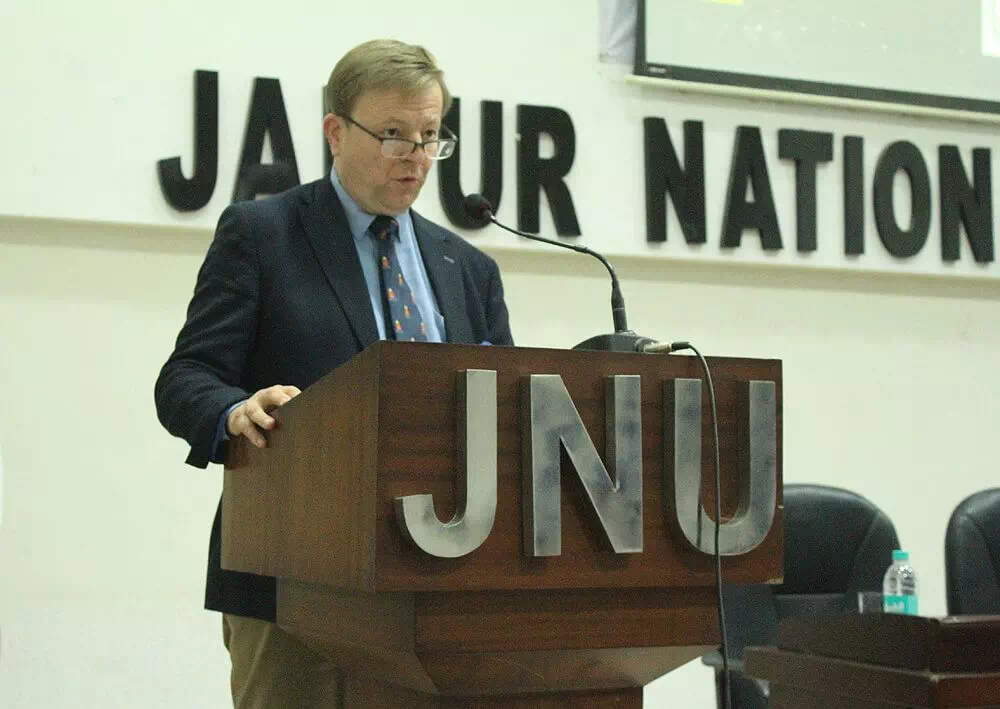
Students of Seedling School of Law and Governance expand their horizons with space law in a guest lecture on “Space law as a self-contained regime or as a branch of international Law?” in Seedling School of Law and Governance, 26th August, 2019.
Human activities in outer space will become ever more important because of increasing commercial activities such as space tourism, civilian and military activities, especially satellite launches, all the way to a potential future mining of extra-terrestrial commodities stemming from celestial bodies. Hence, on the basis of this, Prof Stephan Hobe, Director of the Institute of Air and Space Law, University of Cologne, Germany, delivered a lecture on “Space law as a self-contained regime or as a branch of international Law?” in the Seedling School of Law and Governance, Jaipur National University, Jaipur on 26th August, 2019.
In his lecture to the law students, Prof Hobe pointed out questions like “Some may ask: Why deal with issues so remote when there are so many much closer to us still awaiting a solution? Why reach so far?” With these questions, Prof Hobe cited the historical evolution of space race between the United States and the Soviet Union during the Cold War with the launch of Sputnik-1 in 1957. Prof Hobe believes that the use of space technology is now widespread, not only for military but also for civilian purposes, including satellites for communications, meteorology, television and radio broadcasting and other applications. Prof Hobe notes, “Space law, coming of age and what started out as an exotic field of law and then continued with the discussion and codification of legal rules, following the development of exploratory space activities, is now confronted with the challenge of arriving at just and effective rules for the use of space serving many practical and conflicting economic, political and military interests.”
Citing the examples of Tehran Hostage Case (1980), Wimbeldon Case (1923) or Tadic Case (1996), Prof Hobe examined the role of state and private enterprises. He believed that it was the responsibility of the states to exercise control and regulate the private enterprises in space in terms of exploitation of resources. He spoke about the Relevance of Article III and Article VI of Outer Space Treaty, 1969, in terms of regulations in space. Prof Hobe described about the legal grounds for such human activities in outer space and on celestial bodies. He gave an overview of the history of space flight, of space law and the applicable legal sources as well as the main legal concepts of international space law. On the basis of his lecture, Prof Hobe considered a basic question whether Space Law is seen in terms of self-contained regime or whether it is one of the branches of International Law. He reflected on the fundamental principles of international law various norms regulating outer space, from the peaceful uses of outer space and the principle of non-discrimination in its use, to the non-extension of the principle of sovereignty to space and the characterization of astronauts as “envoys of mankind”.
Some of the Law Students raised the questions of Emergence of powers like China, Role of India in Space Race, Role of ISRO in the recent Chandrayaan Mission. The recent issue of identity theft in space by an Astronaut in the International Space Station being investigated by NASA was raised during the lecture. Issues of Compensation during damages to Space satellites (Debris), Liability, treating space debris as an abandoned property were also raised during the interaction with Prof Hobe. Prof Hobe believes that there is a need for the national and international legal regime to regulate space activities and there are techniques to solve the issues of compensation and liability. Law Students learned about how an international legal framework governs space activities from the beginning of a mission until its very end. They came to discover that national space laws play an important role in the development of space missions and, more broadly, in the development of the space sector in a country. The students came to appreciate that a space mission is an interdisciplinary endeavour spanning topics beyond science and technology to include national and international policy, funding, and law.